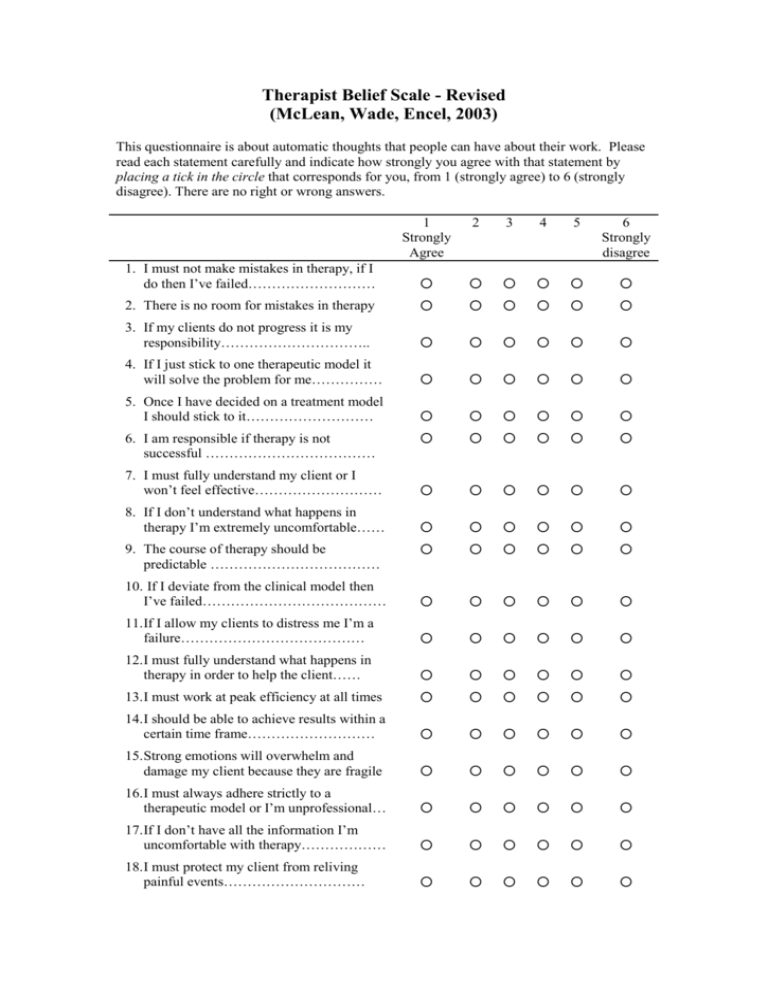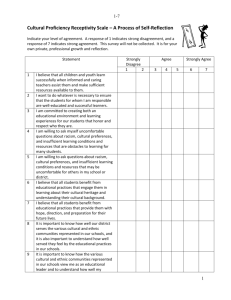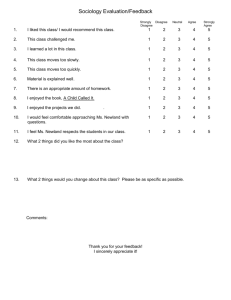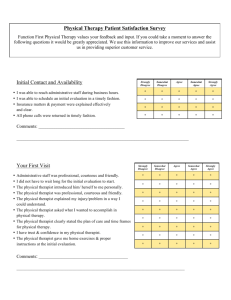Therapist Belief Scale
advertisement

Therapist Belief Scale - Revised (McLean, Wade, Encel, 2003) This questionnaire is about automatic thoughts that people can have about their work. Please read each statement carefully and indicate how strongly you agree with that statement by placing a tick in the circle that corresponds for you, from 1 (strongly agree) to 6 (strongly disagree). There are no right or wrong answers. 1 Strongly Agree 2 3 4 5 6 Strongly disagree 1. I must not make mistakes in therapy, if I do then I’ve failed……………………… 2. There is no room for mistakes in therapy 3. If my clients do not progress it is my responsibility………………………….. 4. If I just stick to one therapeutic model it will solve the problem for me…………… 5. Once I have decided on a treatment model I should stick to it……………………… 7. I must fully understand my client or I won’t feel effective……………………… 8. If I don’t understand what happens in therapy I’m extremely uncomfortable…… 10. If I deviate from the clinical model then I’ve failed………………………………… 11. If I allow my clients to distress me I’m a failure………………………………… 12. I must fully understand what happens in therapy in order to help the client…… 13. I must work at peak efficiency at all times 14. I should be able to achieve results within a certain time frame……………………… 15. Strong emotions will overwhelm and damage my client because they are fragile 16. I must always adhere strictly to a therapeutic model or I’m unprofessional… 17. If I don’t have all the information I’m uncomfortable with therapy……………… 18. I must protect my client from reliving painful events………………………… 6. I am responsible if therapy is not successful ……………………………… 9. The course of therapy should be predictable ……………………………… 1 Strongly Agree 2 3 4 5 6 Strongly disagree 19. If I work hard enough therapy will always be successful………………………… 20. If I allow myself to feel what my client feels I’ll be damaged…………………… 21. I must not allow my client to become too distressed in therapy………………… 22. If I am affected by my client’s story it will paralyse me and make me ineffective… 23. If I have strong reactions to my clients it means I’m abnormal………………… 24. I shouldn’t allow my clients to become distressed, they really want to feel better 25. It is unprofessional to take an eclectic approach to therapy…………………… 26. It is my role to find the solutions to my client’s difficulties……………………… 27. It is unprofessional to act spontaneously in therapy………………………………… 28. I should treat all clients the same way…… 29. I should be emotionally available to my client at all times……………………… Reference: McLean, S., Wade, T.D. & Encel, J. (2003). The Contribution of Therapist Beliefs to Psychological Distress in Therapists: An investigation of Vicarious Traumatisation, burnout and symptoms of avoidance and intrusion. Behavioural and Cognitive Psychotherapy, 31, 417-428. Scoring: (1) low tolerance of distress – 10 items (1, 2, 11, 15, 18, 20, 21, 22, 23, 24); (2) rigid adherence to therapeutic model – 6 items (4, 5, 10, 16, 25, 27); (3) beliefs of responsibility – 7 items (3, 6, 9, 14, 19, 26, 29); (4) need for control and understanding – 6 items (7, 8, 12, 13, 17, 28).








